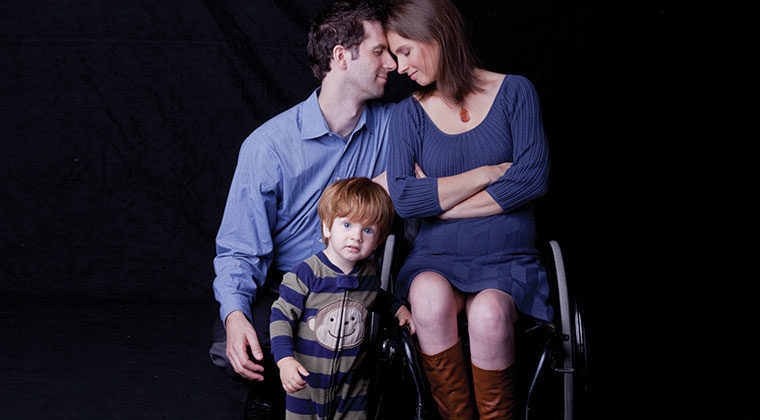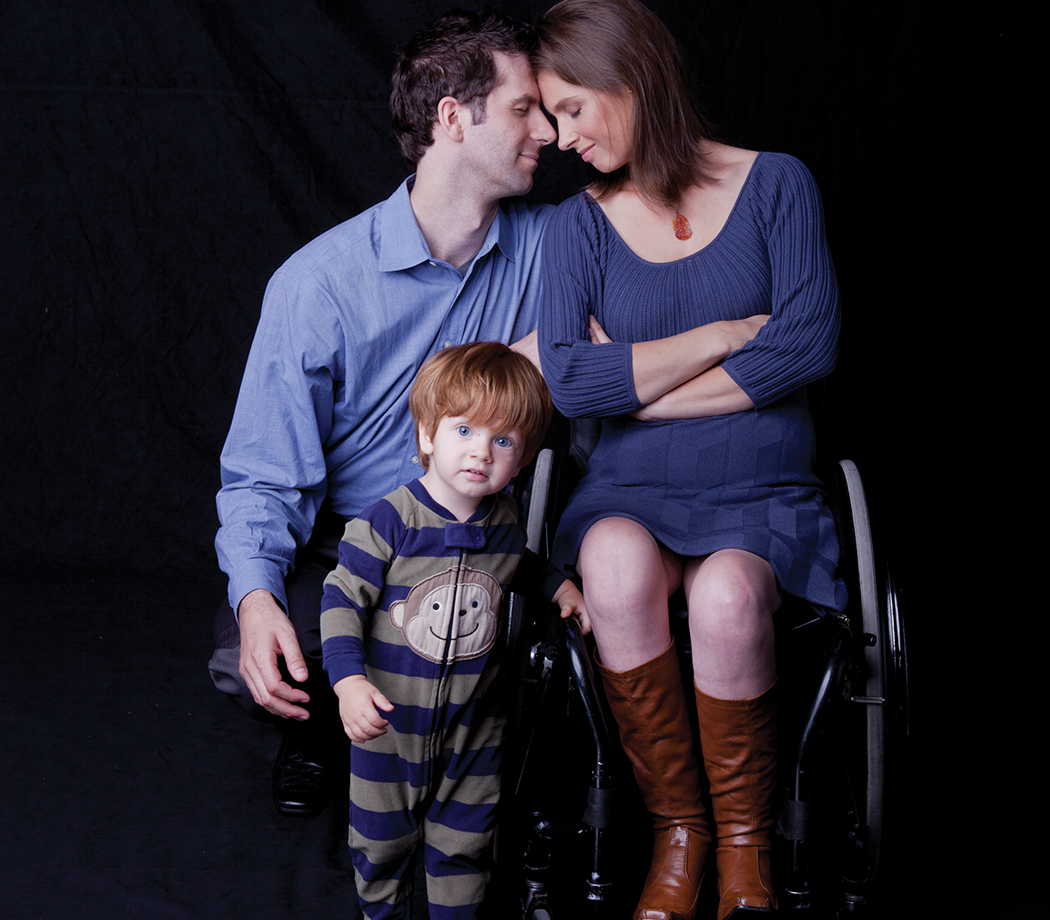Sexual Health for Women
Sex After Paralysis

Sexual identity is a significant and encompassing aspect of one’s personality – sexuality plays an essential role in how we feel about ourselves, how we relate to others, how others relate to us.
To be sure, paralysis often impacts a woman’s sexuality, including changes in physical functioning, sensation and response. Self-image can be shaken.
Women wonder if they can have sex again, whether they can attract a partner, whether the partner will stay, whether having children is possible.
While the range of sexual options may be different, physical attraction and sexual activity are realistic expectations – no matter the level or completeness of paralysis. Sexual pleasure is possible.
Paralysis itself doesn’t affect a woman’s libido or her need to express herself sexually, nor does it affect her ability to conceive a child. Generally speaking, sexuality in women living with paralysis is less affected than in men.
It is physically easier for a woman to adapt her sexual role, even though it may be more passive than that of a non-disabled woman. While the level of sexual desire may be the same in women with disabilities, the level of activity is generally less because it can be difficult to find a romantic partner.
The key to successfully redefining one’s sexual identity is experimentation and open communication. It helps to understand the anatomy and physiology of sexual function and sexual response.
It may also help to connect with appropriate resources and knowledgeable health care professionals or counselors to review the available options. Sexuality does not disappear after paralysis. Explore sexuality with an open heart and open mind.
Physical and Emotional Changes in Sexuality
There are no physiological changes after paralysis that prevent women from engaging in sexual activity, but there are a number internal shifts across the body. For example:
- Positioning can be an issue but can usually be accommodated.
- Autonomic dysreflexia can be anticipated and controlled.
- Many women experience a loss of vaginal muscle control and many are unable to produce vaginal lubrication. Both problems are likely the result of the interruption in normal nerve signals from the brain to the genital area. While there is no remedy for muscle loss, lubrication, of course, can be augmented.
Typically, lubrication occurs as a psychogenic (mental) and reflex (physical) response to something sexually stimulating or arousing. It has been suggested that lubrication in women is the physiological equivalent of the erection in the male, and is probably innervated in the same way. Women can substitute water-based (never oil-based, such as Vaseline) lubricants such as K-Y Jelly.
Low sex drive is common among women with paralysis. Meanwhile, Viagra was clinically tested by a group of women with spinal cord injuries and almost all reported that the drug stimulated arousal. In some, it enhanced lubrication and sensation during intercourse.
In some conditions of paralysis, such as multiple sclerosis, cognitive problems can undermine sexuality. People with short-term memory or concentration loss may drift off during sexual activities in a way that can be disheartening to the partner. It requires love and patience, with lots of communication, to bring this out in the open and to seek the needed psychological or medical treatment.
Women who are paralyzed often fear bowel and bladder accidents during times of intimacy. There are a number of ways to reduce the chance of accidents.
The first is to limit fluid intake if a sexual encounter is planned. Women who use intermittent catheterization should empty the bladder before beginning sexual activity. Women who use a suprapubic or Foley catheter find that taping the catheter tube to the thigh or abdomen keeps it out of the way. The Foley can be left in during sexual intercourse because, unknown to many men and even women, the urethra (urinary opening) is separate from the vagina.
The best way to avoid a bowel accident is to establish a consistent bowel program. Women may also want to avoid eating right before engaging in sexual activity. With good communication, an occasional bladder or bowel accident won’t destroy a rewarding sex life.
Intimacy
Sexual success is often measured by whether or not partners achieve orgasm. A woman with paralysis, like men with similar levels of function, can achieve what is described as a normal orgasm if there is some residual pelvic innervation.
Dr. Marca Sipski of the University of Alabama School of Medicine thinks paralyzed women retain an orgasm reflex that requires no brain input. The ability to achieve orgasm seems unrelated to the degree of neurological impairment in women with lesions down to T5 level. Her research indicates the potential is still there, but women may give up trying to have orgasms because they lack or have limited sensation in the genital area.
A small body of research suggests that women with SCI can achieve orgasm using a clitoral vacuum suction device (Eros device), FDA approved to treat female orgasmic dysfunction. The device increases blood flow, thus creating clitoral engorgement that may increase vaginal lubrication and heighten orgasm response.
Some paralyzed men and women, with practice and focused thought, are able to experience a “phantom orgasm,” through reassignment of sexual response. This involves mentally intensifying an existing sensation from one portion of their body and reassigning the sensation to the genitals
Pregnancy
Women with paraplegia or tetraplegia who are of childbearing age usually regain their menstrual cycle. In fact, nearly 50 percent do not miss a single period following injury.
Pregnancy is possible and generally not a health risk. While most paralyzed women can have normal vaginal deliveries, certain complications of pregnancy are possible, including increased urinary tract infections, pressure sores and spasticity. Autonomic dysreflexia is a serious risk during labor for those with injuries above T6. Also, loss of sensation in the pelvic area can prevent the woman from knowing that labor has begun.
Another potential risk of pregnancy is the development of thromboembolism, in which blood vessels become blocked by clots. With high thoracic or cervical lesions, respiratory function may be impaired with the increased burden of pregnancy or the work of labor, requiring ventilator support.
Women living with disabilities often do not receive adequate healthcare services. For example, routine pelvic exams are not done due to lack of awareness of the need, problems getting onto the exam table, or not being able to find a doctor with knowledge about their disability.
Providers might wrongly assume that women with disabilities are not having sex, especially if their disability is severe, and therefore may neglect to screen these women for sexually transmitted diseases (STDs) or even perform a full pelvic exam.
Unfortunately, some healthcare providers even suggest to women with disabilities that they abstain from sex and not bear children, even if they can conceive children.
Breast Health
Women with disabilities must be aware that they are among the one in eight women who will get breast cancer. Screening is essential.
Women with limited use of their arms and hands may need to perform exams using alternate positions or with the help of an attendant or family member.
In the clinic, getting a wheelchair in the door is the easy part but there are many medical offices and equipment that are not accessible. Services or programs provided to patients with disabilities must be equal to those provided for persons without disabilities.
Birth Control
Since paralysis does not usually affect fertility in the female, contraception is important. There are also some special considerations. Oral contraceptives are linked to inflammation and clots in blood vessels, and the risk of these is greater with spinal cord injury.
Intrauterine devices cannot always be felt in the paralyzed woman and may cause undetected complications. Use of diaphragms and spermicides can be difficult for those with impaired hand dexterity.
Wheelchair Barbie Goes to the Gynecologist
The reproductive and sexual health of women living with paralysis is often overlooked by society, medical professionals and women themselves.
This webinar seeks to empower women with perspective and information on their reproductive and sexual health and explores a number of topics including the importance of reproductive and sexual health for women with paralysis, secondary conditions that impact reproductive health, sexuality for women with paralysis, barriers to quality health care and their consequences, and strategies for locating accessible health care services.
Presenter Cody Unser, MPH, shares her own experiences with the health care system as a woman living with paralysis.
Recorded live on April 17, 2019.
Video: Women’s Sexual Health
Resources
If you are looking for more information on sexual health or have a specific question, our Information Specialists are available business weekdays, Monday through Friday, toll-free at 800-539-7309 from 9:00 am to 8:00 pm ET.
Additionally, the Reeve Foundation maintains a fact sheet on female sexuality and pregnancy with additional resources from trusted Reeve Foundation sources. Check out our repository of fact sheets on hundreds of topics ranging from state resources to secondary complications of paralysis. Download our booklet on sexuality and reproductive health after paralysis.
We also encourage you to reach out to other support groups and organizations, including:
- CareCure Community hosts a relationships and sexuality forum.
- Center for Research on Women with Disabilities (CROWD) focuses on issues related to health (including reproduction and sexuality), aging, civil rights, abuse and independent living.
- mobileWomen is a comprehensive content portal for women with disabilities. The site, supported in part by the Reeve Foundation, features articles, resources and a place to share experiences and solutions.
- Rehabilitation Institute of Chicago (RIC) provides educational materials on sexual health.



